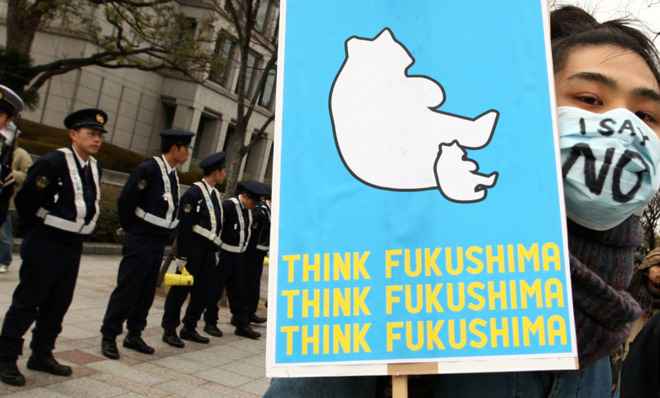The political instability of nuclear power
Nuclear power may be a relatively clean source of energy. But it can be politically toxic.


Nuclear power occupies a weird space in American politics. Environmental types tend to dislike it, despite the fact that it's almost entirely carbon-free. Conservatives love it, even though, with its heavy reliance on government funding, it's the most socialist power system imaginable.
But there's one aspect of nuclear that gets comparatively little attention: its inherent political vulnerability. This recent report offers a good example of why nuclear is so iffy:
Researchers say radioactive cesium isotopes from Japan's severely damaged Fukushima nuclear power plant have made their way to the waters just off the coast of Canada. [UPI]
That's right. Three years after the nuclear meltdown in Fukushima, we're pretty sure a radioactive plume just finished crossing the dang Pacific Ocean.
The Week
Escape your echo chamber. Get the facts behind the news, plus analysis from multiple perspectives.

Sign up for The Week's Free Newsletters
From our morning news briefing to a weekly Good News Newsletter, get the best of The Week delivered directly to your inbox.
From our morning news briefing to a weekly Good News Newsletter, get the best of The Week delivered directly to your inbox.
Luckily, the radioactive cesium is so diluted by this point that it poses no danger (so far anyway). But nuclear meltdowns freak people out, and for good reason. The hazards are obvious and easy to understand: Invisible poison! Cancer! Mutation! Early, painful death! And, it turns out, radioactive plumes stretching 4,800 miles across the ocean!
What's worse, meltdowns last forever, both in terms of the damage they inflict and their lifespan in the media. Chernobyl is still ring-fenced, and they'll be cleaning up Fukushima for decades, if not centuries. While most people have forgotten about the massive explosion at the fertilizer plant in West, Texas, nuclear meltdowns generate a steady stream of bad press for a long time.
Nuclear boosters argue that the dangers of Fukushima have been exaggerated, and don't apply anyway to the U.S., which isn't nearly so tsunami- or earthquake-prone. They make some good points. But one does have to make a concession to political reality. Just look at Germany, which got so unnerved post-Fukushima that it retired all its nuclear stock. Japan did the same, leading to a spike in oil consumption and imports.
In other words, for a supposedly clean and stable source of energy, nuclear is extremely unreliable.
A free daily email with the biggest news stories of the day – and the best features from TheWeek.com
It would be a different story if nuclear were super-cheap and political panic were the only obstacle preventing its deployment on a grand scale. But the opposite is true. While wind and (especially) solar have been crashing in price, nuclear has actually been getting more expensive. New nuclear plants are stupendously costly to build, maintain, and insure, which is why they can only be built with colossal government subsidies.
The point shouldn't be taken too far. I am still mildly pro-nuclear, because every carbon-free technology deserves thorough research and scrutiny. If it is a choice between coal and nuclear, nuclear is the obvious choice. But if it is a choice between nuclear and renewables, the choice is much less clear. Few things would be worse than going big on nuclear, only to abandon the endeavor halfway over political considerations.
Ryan Cooper is a national correspondent at TheWeek.com. His work has appeared in the Washington Monthly, The New Republic, and the Washington Post.
-
 The best dark romance books to gingerly embrace right now
The best dark romance books to gingerly embrace right nowThe Week Recommends Steamy romances with a dark twist are gaining popularity with readers
-
 The ocean is getting more acidic — and harming sharks’ teeth
The ocean is getting more acidic — and harming sharks’ teethUnder the Radar ‘There is a corrosion effect on sharks’ teeth,’ a study’s author said
-
 6 exquisite homes for skiers
6 exquisite homes for skiersFeature Featuring a Scandinavian-style retreat in Southern California and a Utah abode with a designated ski room
-
 The billionaires’ wealth tax: a catastrophe for California?
The billionaires’ wealth tax: a catastrophe for California?Talking Point Peter Thiel and Larry Page preparing to change state residency
-
 Bari Weiss’ ‘60 Minutes’ scandal is about more than one report
Bari Weiss’ ‘60 Minutes’ scandal is about more than one reportIN THE SPOTLIGHT By blocking an approved segment on a controversial prison holding US deportees in El Salvador, the editor-in-chief of CBS News has become the main story
-
 Has Zohran Mamdani shown the Democrats how to win again?
Has Zohran Mamdani shown the Democrats how to win again?Today’s Big Question New York City mayoral election touted as victory for left-wing populists but moderate centrist wins elsewhere present more complex path for Democratic Party
-
 Millions turn out for anti-Trump ‘No Kings’ rallies
Millions turn out for anti-Trump ‘No Kings’ ralliesSpeed Read An estimated 7 million people participated, 2 million more than at the first ‘No Kings’ protest in June
-
 Ghislaine Maxwell: angling for a Trump pardon
Ghislaine Maxwell: angling for a Trump pardonTalking Point Convicted sex trafficker's testimony could shed new light on president's links to Jeffrey Epstein
-
 The last words and final moments of 40 presidents
The last words and final moments of 40 presidentsThe Explainer Some are eloquent quotes worthy of the holders of the highest office in the nation, and others... aren't
-
 The JFK files: the truth at last?
The JFK files: the truth at last?In The Spotlight More than 64,000 previously classified documents relating the 1963 assassination of John F. Kennedy have been released by the Trump administration
-
 'Seriously, not literally': how should the world take Donald Trump?
'Seriously, not literally': how should the world take Donald Trump?Today's big question White House rhetoric and reality look likely to become increasingly blurred
